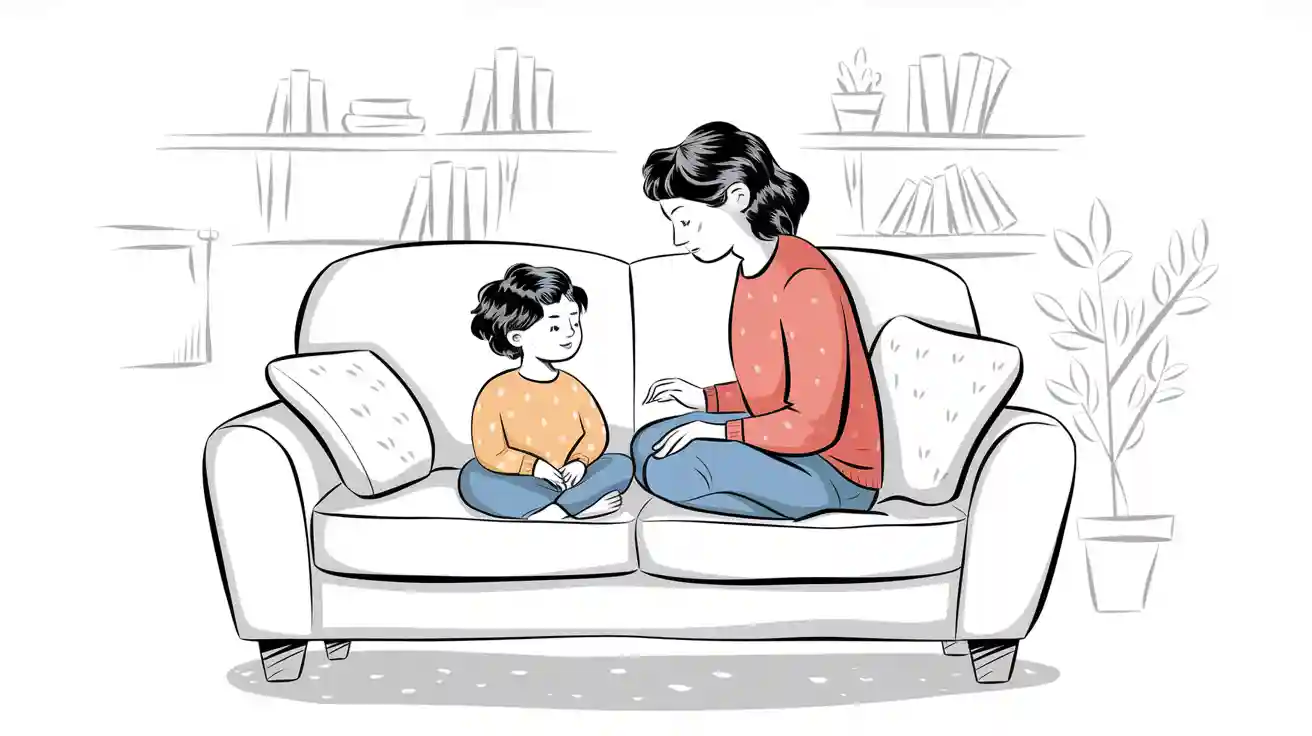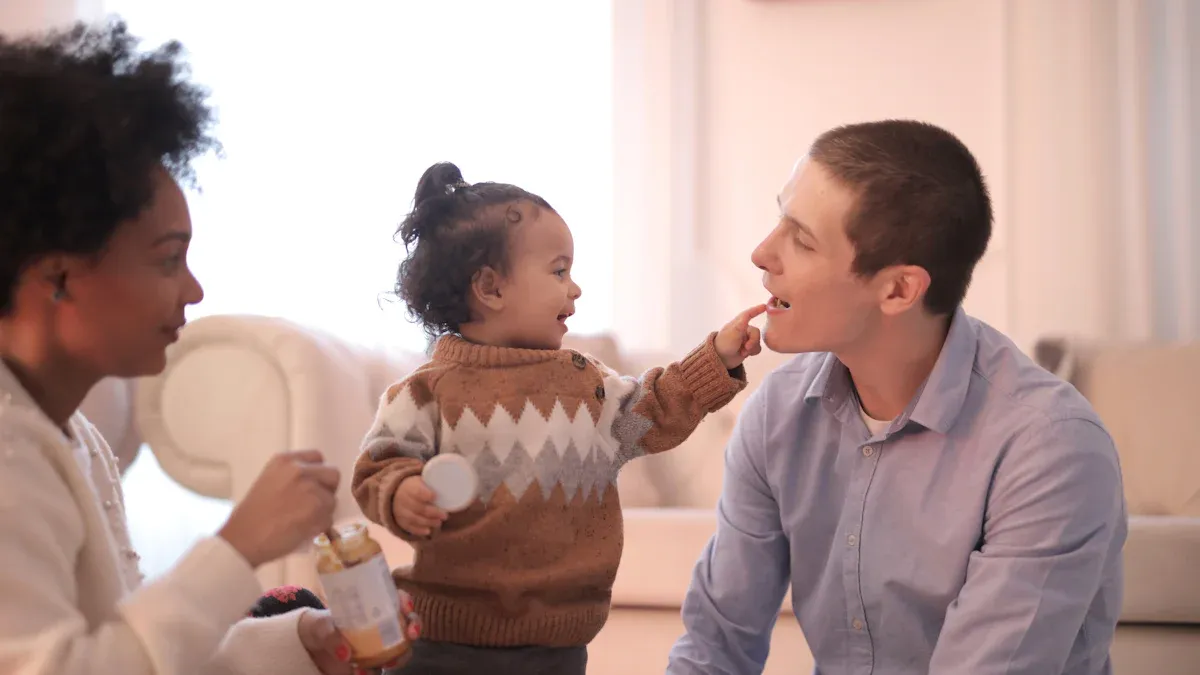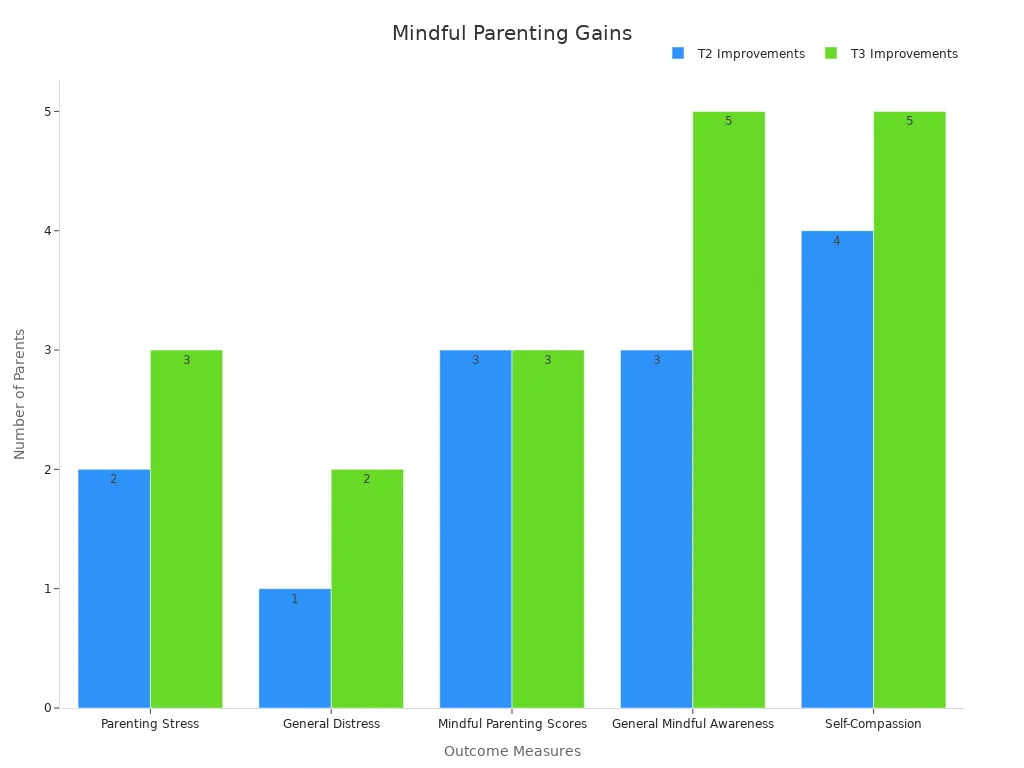Practical steps for nurturing mindful children at home

Have you ever wanted to stay calm when things get hard at home and feel closer to your child? You are not the only one. Many parents want a way to parent that brings more happiness and less worry. Mindful parenting can help with this. It uses patience, being present, and giving positive feedback. Studies show mindful parenting helps you show how to handle feelings, talk better, and lower stress for everyone. When you are patient and use mindful parenting, you make a caring place where your child can be creative and happy. Even small changes can last a long time. Suited Tutor supports this way and helps families build stronger bonds and do well in school.
Key Takeaways
Practise patience every day by stopping, taking deep breaths, and saying how you feel. This helps you stay calm and teaches your child to handle feelings.
Give your full attention to your child by listening carefully and spending time together without distractions. This builds trust and helps you talk better with each other.
Use positive reinforcement by giving clear praise. Notice your child's hard work to help them keep growing and feel more confident.
Make clear family rules and start mindful rituals. This helps your home feel safe, caring, and close for everyone.
Take care of yourself with self-care and kindness. This helps you stay patient and strong, and shows your child how to face problems kindly.
Why mindful parenting matters
Emotional well-being
When you use mindful parenting, your child feels safe. You notice how they feel and show you care. This helps you understand them, even if they are upset. Mindful parenting also helps you control your own feelings. If you stay calm, your child learns to stay calm too. Research by Singh and others shows children act out less with mindful parenting. They have fewer behaviour problems. You notice your child’s hard work and help them. This makes them feel more confident.
During hard times, like the COVID-19 pandemic, families felt more stress. Children sometimes worry or act out because of this. Mindful parenting helps you be patient and kind. You teach your child to deal with strong feelings. This can lower their anxiety and make them happier. When you really connect, your child knows their feelings matter. Over time, both of you feel better emotionally.
Family connection
Mindful parenting is not just about feelings. It also makes your family closer. You spend time together, listen, and share things. Studies with many families show mindful parenting improves relationships. Both mums and dads feel closer to their children. Dads especially become more aware of feelings when they join mindful family programmes.
You can connect by listening and caring about your child’s world. This builds trust and respect between you. Studies show mindful parenting leads to more caring and helpful actions. When you focus on connection, everyone feels important at home. The bond with your child gets stronger. This helps you face problems together.
Suited Tutor supports mindful parenting. Our tutors help families build strong bonds and good habits. With our special courses and resources, you can help your child grow and keep your family close.
Patience in mindful parenting
Practising patience daily
Patience is not something you just have. You can grow it each day, like building a muscle. When you show patience and kindness, your child learns how to deal with hard times. Sometimes, you might get angry if your child does not listen or has a tantrum. Try not to react right away. Stop for a moment and take a deep breath. This helps you stay calm. It also gives your child time to calm down.
You can use easy ways to practise patience every day:
Breathing exercises: Breathe in and out slowly three times. Focus on your breath. This helps your mind slow down.
Counting to ten: If you feel upset, count to ten before you talk. This gives you time to think and answer kindly.
Name your feelings: Say, “I feel angry now.” Naming your feeling helps you control it.
Tip: Children copy what you do. When you show patience, they learn how to handle their own feelings.
Research shows that more patience in parenting means less stress and better family bonds. The table below shows what some studies found about mindful parenting:
Study / Intervention | Sample Size | Outcome Measures | Numerical Findings | Notes |
|---|---|---|---|---|
Mindful Parenting Program (general) | N/A (pilot study) | Parental stress, parental rearing style, marital satisfaction, co-parenting | Significant reductions in parental rejection, parental stress; increased marital satisfaction | Small sample, no control group, preliminary evidence |
Mindful Motherhood (Vieten & Astin, 2008) | 31 pregnant women (RCT) | State anxiety, mood | Significantly lower anxiety and better mood vs. waitlist controls post-intervention; effects not sustained at 3-month follow-up | Small RCT, no infant development follow-up |
Meditation and Executive Attention (Jha et al., 2007; Tang et al., 2007) | Varies | Attention Network Test performance | Improved conflict monitoring and orienting skills after mindfulness training; control groups showed no improvement | Supports cognitive mechanisms underlying mindful parenting |
Emotional Interference Task (Ortner et al., 2007) | Varies | Emotional interference in attention tasks | Longer meditation experience correlated with less emotional interference; mindfulness group showed reduced emotional interference after 7 weeks | Supports improved emotional regulation |
These studies show that when you are patient and kind, you feel less stress and a better mood. You also help your child pay attention and control their feelings.
Patience pause rituals
Sometimes, you need more than a deep breath. That is when patience pause rituals help. These are small habits you use when things get hard. They help you pause before you react.
Here are some simple rituals you can try:
The “Pause and Sip” Ritual: Keep a drink nearby. When you feel stressed, take a slow sip. Use this time to calm your mind.
The “Step Back” Ritual: If your child is upset, step back for a few seconds. Look out the window or at something calm. This short break helps you come back with more kindness.
The “Mantra Moment”: Say a calming phrase, like “This too shall pass” or “I can handle this.” Say it out loud or in your head to feel calm and patient.
Dr. Cindy, who is a parenting expert, says patience can change hard moments. She says if you calm yourself first, you can be kinder to your child. For example, when her children argue, she takes a breath before helping. Her children see this and start to do it too. You do not have to be perfect. If you are patient most of the time, you are doing well. This helps you feel less guilty and makes your bond with your child stronger.
A study in PMC found that mothers who used responsive parenting, which needs patience, got much better at helping their children. They became more caring, smiled more, and answered their child’s needs faster. Their children also got better at making friends and thinking. This shows that being patient helps your child grow in many ways.
Note: At Suited Tutor, we know every family has hard times. Our tutors give you real tips to help you and your child do well. We have special courses and resources to help you build patience, kindness, and strong family bonds. You can get more help at Suited Tutor and Suited Tutor Courses.
When you practise patience every day and use pause rituals, your home becomes calm and caring. You show your child it is okay to have big feelings and that you can handle them together. Over time, you will see more peace, more smiles, and a closer bond with your child.
Presence and engagement

Active listening
When you are with your child, give them all your attention. Listen to what they say and watch how they act. Show that you care about their words and feelings. If you use active listening, your child feels important and understood. This helps you trust each other and talk better at home.
Try these ways to listen well:
Put your phone or screens away.
Look at your child and nod to show you listen.
Say back what your child said using your own words.
Ask gentle questions so they can share more.
Many parent-child programmes, like Parent-Child Interaction Therapy and the Positive Parenting Program, teach parents to be present and engaged. These ways have helped many families have fewer behaviour problems and stronger bonds. When you listen closely, your child learns to talk about their thoughts and feelings. You both feel closer.
Tip: If you listen without judging or stopping your child, they feel safe to talk. This makes your bond stronger and helps your child feel more sure of themselves.
Distraction-free time
Children need time without distractions to focus and grow. When you set aside special time, you show your child they are important. You could read a book, play a game, or talk about your day together.
Research shows children pay better attention and learn more when there are no distractions. Look at the table below:
Aspect | Evidence Summary | Implication for Distraction-Free Attention |
|---|---|---|
Focused Attention Definition | Children learn best when they focus on one thing. | Distraction-free time helps your child think and remember more. |
Developmental Trends | Young children get better at ignoring distractions as they grow. | A calm space helps this natural growth. |
Parental Emotional Support | Praise from parents helps children focus longer. | Your support during special time boosts their attention. |
Parental Control | Too much control can distract children. | Let your child lead sometimes to keep them interested. |
Contextual Variability | Attention changes with different tasks and places. | Distraction-free routines work in many places. |
Brain scans show too much screen time makes it harder for children to pay attention. Reading printed books or telling stories helps your child’s brain grow. Even a phone nearby can distract your child. Try to have times when you both put away devices and focus on each other.
At Suited Tutor, we know being present and giving your child special time helps them do well. Our tutors use these ideas to help children learn and build strong bonds. You can find more tips and expert help at Suited Tutor Courses, where we help families make good routines at home.
Positive reinforcement at home

Positive reinforcement is a key part of positive parenting. When you use it at home, your child feels important and wants to do well. You do not just give rewards for good behaviour. You also show your child which actions matter and explain why. This helps your child feel sure of themselves and learn to keep trying.
Recognising effort
You might see your child working hard on a puzzle or cleaning their room. When you notice their effort, you show that trying is as important as winning. This is a big part of positive reinforcement. Children who feel noticed for trying will keep going, even when things are hard.
You can use easy ways to notice effort every day: Give a high five or smile when your child tries something new. Say, “I saw you keep going, even when it was hard.” Use a sticker chart or reward jar to celebrate small steps.
Many families find that reward charts help children see how they are doing. Let your child add a sticker each time they are kind or finish homework. Over time, these small rewards help your child see that effort leads to success.
The Incredible Years programme is used by many parents and teachers. It shows that specific praise and positive reinforcement help children behave better and learn about feelings. When you focus on effort, you help your child become stronger and feel good about themselves. This is a key part of positive parenting that really helps at home.
Tip: Pick rewards your child likes. Some children love stickers, but others might want extra story time or a special treat.
Specific praise
Not all praise is the same. You might say “Good job!” or “Well done!” but these are general words. They sound nice, but they do not tell your child what they did right. Specific praise, also called process praise, points out the action or effort you want to see more.
Here is a table to show the difference:
Type of Praise | Example | Impact on Child |
|---|---|---|
Generic (Person) Praise | “You’re so smart!” | Can make children think their skills cannot change. They might avoid hard things to keep their “smart” label. |
Specific (Process) Praise | “I love how you kept trying with your maths homework.” | Helps children see that effort brings success. They keep trying and feel more sure of themselves. |
Research by Kamins & Dweck (1999) and Cimpian et al. (2007) shows that specific praise helps children stay motivated and believe in themselves. Children who hear specific praise keep trying after things go wrong. They learn that hard work matters more than just being “good” at something.
You can use specific praise in many daily moments: “Thank you for sharing your toys with your sister. That was very kind.” “You did a great job putting your books back on the shelf.” “I noticed you finished your homework before dinner. That shows good planning.”
When you use positive reinforcement with specific praise, your child knows exactly what you like. This makes it more likely they will do it again. Over time, your home becomes a place where effort, kindness, and growth are important.
Note: Teachers and tutors at Suited Tutor use specific praise to help students stay interested and try their best. Our tutors know that clear, positive feedback helps children feel confident and do well. You can learn more about these ideas in our courses and podcasts, made to help families across the UK.
Positive reinforcement works best when you use it right away and do it often. You can start with small rewards, like a sticker or a special activity, and then use praise alone as your child learns good habits. This helps children become more independent and responsible.
If you want more ideas for using positive reinforcement at home, Suited Tutor has expert advice, online courses, and family resources. Our team helps families build caring homes where every child can do well.
Mindful parenting tips for families
Setting boundaries
You want your child to feel safe and sure of themselves. One good mindful parenting tip is to set clear rules at home. These rules help your child know what will happen and what you expect. When you use clear rules, your child feels safe. They know you care about them and want good things for them.
Start by talking about family rules with everyone. For example, you can agree on how long to use screens or when to do homework. Make sure everyone knows the rules and why they are important. You can use a simple table to help remember:
Family Rule | Why It Matters | When/How We Follow It |
|---|---|---|
No phones at dinner | Helps us connect as a family | Every evening meal |
Homework before TV | Learning comes first | After school, before TV |
Bedtime at 8:30 pm | Rest is important | Every night |
Research from the Mindfulness-enhanced Strengthening Families Program shows that clear rules and being present help children feel safe and make families work better. When you set rules, stay calm and listen to your child’s feelings. This helps your child trust you and makes your bond stronger.
Tip: Set a good example. Show your child you follow the same rules, especially with screens and handling your feelings.
Mindful family rituals
Family rituals help everyone feel close. When you make mindful rituals, your child feels special and part of the family. These rituals can be simple, like reading a story before bed, saying what you are thankful for, or having a game night each week.
Mindful parenting means you pay attention during these times. Put away things that distract you and focus on your family. The MSFP says that mindful family rituals, like praying together or eating meals together, help children feel safe and help everyone talk better. These small things help your child feel loved and safe.
Here are some ideas to try:
Have breakfast together and say something positive to start the day.
At dinner, share one thing you like about each other.
Go for a walk and notice what you see and hear.
When you use mindful parenting, you show your child how to handle feelings and enjoy time together. These rituals help you grow closer and make happy memories. Suited Tutor helps families build these habits with expert courses and resources, so you can feel more sure as a parent.
Modelling mindful behaviour
Calm responses
You show your child how to act at home. If you stay calm when things get hard, your child learns to handle stress. Children watch adults all the time. They see what you do when something goes wrong. If you stop and take a breath, you teach them to pause and think. This helps them learn to wait before they act. This is a strong way to show mindfulness.
Research shows calm talking helps children control themselves and care about others. Parent–Child Interaction Therapy says calm parents have fewer fights at home. Children also work together more. You may see less arguing and more teamwork in your family. When you show mindfulness, your child feels safe and understood.
Try these easy steps:
Stop and breathe before you answer your child.
Use a soft voice, even if you feel upset.
Say your feelings out loud. For example, “I feel frustrated, so I am calming down.”
Remember, when you stay calm, your child learns big feelings are okay and can be handled.
Studies also show parents who notice their own feelings have better bonds with their children. You can make your home peaceful by showing how to handle feelings with care.
Sharing your practice
You do not need to be perfect to show mindfulness. Share your own mindfulness habits with your child. Let them see you take a break, meditate, or write in a journal. When you talk about your feelings and how you deal with them, your child learns important skills.
Research finds that when parents share mindfulness, children want to learn too. Mindfulness-based parenting programmes help families become stronger and handle feelings better. Children who see parents use self-awareness and coping skills learn to control their feelings and keep trying.
You can try these ideas at home:
Ask your child to join you for a short breathing exercise.
Talk about a time you felt stressed and what you did.
Celebrate small wins together, like staying calm on a hard day.
Tip: Doing things the same way each day and talking openly helps your child feel safe and ready to learn.
At Suited Tutor, we know showing mindful behaviour helps children become confident and strong. Our tutors use mindfulness in lessons and family workshops. You can find more help, courses, and tips at Suited Tutor Courses and the Suited Tutor Podcast. Together, you and your child can build a strong, mindful base for success.
Self-care for parents
Looking after yourself
You do a lot for your family every day. Sometimes, you forget to care for yourself. When you meet your own needs, you become a better parent. You feel calmer and more patient. You are also ready for hard times. Many parents who try mindfulness courses see big changes at home.
Here is what some research found:
59% of parents gave high scores for the strengths and positive parts section.
56% said the course helped their child feel better.
47.22% gave high marks for mindfulness with children.
Parents said they had more patience, were more present, and noticed their feelings more after training.
Measure | Effect Size (d) | 95% Confidence Interval | p-value | Sample Size | Description |
|---|---|---|---|---|---|
Parenting Mindfulness Scores | 0.62 | 0.11 to 1.13 | 0.02 | 1,340 | Mindful parenting had a moderate effect on mindfulness for parents of children who are developing as expected |
When you care for yourself, you help your child too. You show them that self-care is important. Try easy things like a short walk, a cup of tea, or a few quiet minutes. These small things can really help.
Tip: You do not need lots of time. Even five minutes for yourself can help you feel better.
Suited Tutor helps parents with expert courses and resources. Our tutors know self-care matters and help families make good habits. You can get more tips at Suited Tutor Courses and the Suited Tutor Podcast.
Self-compassion
Being a parent can be hard. You might feel bad or worry about mistakes. Self-compassion means being kind to yourself, even when things go wrong. Research shows parents who use self-compassion feel less stress and more joy.
Mindfulness-based courses for parents have shown:
Self-compassion scores go up by 19-20% after training.
Parental stress goes down by 22%.
Perceived stress drops by 33%.
Psychological well-being goes up by 9%.
Parents who learn self-compassion say they control their feelings better. They also have stronger friendships and feel happier with life. They feel less guilt and worry. Some studies show that when parents practise compassion, their children feel less stress too.
You can start by noticing your feelings and speaking kindly to yourself. If you have a hard day, remember all parents have tough times. Celebrate small wins and forgive yourself for mistakes.
Remember: You are doing your best. Self-compassion helps you stay strong and close to your family.
Suited Tutor supports self-care and compassion in every course. Our tutors guide you through mindful parenting, so you and your child can do well together. Try our courses and join a group that cares about your well-being.
Suited Tutor and family well-being
Holistic support
You want your family to do well, not just get by. That is why Suited Tutor helps with more than just schoolwork. We care about your child’s learning and your family’s feelings. You get more than lessons. You get a team that cares about your child’s whole journey.
Research shows families, schools, and communities help most when they work together. Children feel safer and do better in life. You help your child become stronger and feel good about themselves. This also helps them deal with stress. Kind and caring parenting can protect children during hard times. When you get help from home and school, your child’s mental health gets even better than with just one.
Help from family, school, and friends leads to better mental health.
Less support means more stress and lower well-being.
Good relationships help children learn social skills and feel confident.
Suited Tutor is known as the UK’s top tutoring provider. You get expert tutors, trusted courses, and a group that values your child’s needs. Our way brings together learning, mental health, and family support.
Programme Name | Key Outcomes |
|---|---|
Keeping Families Strong (KFS) | Children cope better, feel closer to family, and have better mental health |
Parent Management Training – Oregon | Parents feel less stress, learn better skills, and children behave better |
New Beginnings Program (NBP) | Young people have better mental health and behaviour, especially if they had more problems before |
Resources and guidance
You do not have to do this by yourself. Suited Tutor gives you lots of help for mindful parenting. Our online courses, podcasts, and workshops give you easy tools to use every day.
Studies show that getting help, like at Suited Tutor, lowers parent stress and helps families get along. Mindful parenting programmes with meditation, learning, and advice help you feel more sure and ready. You learn to handle tough times, connect with your child, and make your home happier.
Tip: Try a short meditation or listen to a Suited Tutor Podcast with your family. Small steps can really help.
You can look at our trusted courses at Suited Tutor Courses, listen to the Suited Tutor Podcast, or join our friendly group. With Suited Tutor, you get the UK’s best family well-being help, all made to help your family do well.
You can help your home be more mindful by using patience, being present, and giving positive reinforcement. Begin with easy changes and notice each small improvement. Research shows mindful parenting really helps families:
Outcome Measure | Number of Parents Improved | Notes |
|---|---|---|
Parenting Stress | 3 of 6 | Less stress after some time |
Mindful Parenting Scores | 3 at T2; half at T3 | Steady progress as time goes on |
Self-Compassion | 4 at T2; 5 at T3 | Most parents became kinder to themselves |

Do not forget, mindful parenting takes time and practice. You do not have to do everything by yourself. Suited Tutor has expert courses and helpful resources for your family. Every small step is important, so be proud of what you achieve!
FAQ
What is mindful parenting and why does it matter?
Mindful parenting means you notice your child’s feelings and what they do. You try to stay calm and focus on the moment. Oxford University found that mindful parenting lowers stress at home. It also helps children do better in school. Suited Tutor uses these ideas in every course.
How can I use positive reinforcement at home?
You can praise your child for trying hard, not just for winning. For example, say, “I saw you work hard on your homework.” Research shows that giving this kind of praise helps children feel more confident and want to keep trying. Suited Tutor’s tutors use positive reinforcement to help children do their best.
How much time should I spend on mindful activities each day?
Even ten minutes of special time can help a lot. You could read a book together, eat a meal, or do a short breathing exercise. The University of Exeter found that doing mindful routines often makes families feel happier. Suited Tutor Courses have simple ideas for busy families.
Can Suited Tutor help my family build better habits?
Yes! Suited Tutor is the UK’s top tutoring provider. Our courses and podcasts help you learn mindful parenting, good routines, and how to do well at school. You get help from great teachers and trusted resources. Visit Suited Tutor Courses to get started.
See Also
Encouraging Teenagers To Develop Self-Reliance And Confidence
Promoting A Growth Mindset To Enhance Student Learning
The Role Of Positive Discipline In Supporting Child Growth
Improving Parent-Child Bonds Through Open And Honest Dialogue
Identifying And Assisting Key Milestones In Child Development

